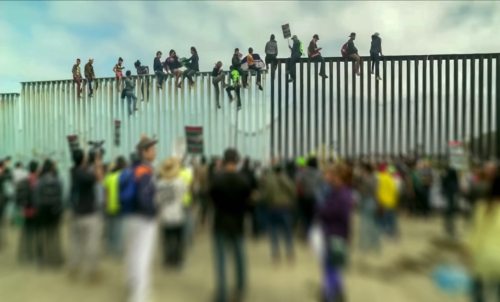
In a move that has sparked widespread controversy and debate, El Paso Magistrate Judge Humberto Acosta ordered the release of a large group of illegal immigrants on Easter Sunday, following their involvement in a violent confrontation with National Guard troops along the Rio Grande. This decision, made on April 1st, 2024, has raised serious questions about the balance between justice, border security, and the handling of illegal immigration in the United States.
The incident in question occurred on March 21st, when approximately 600 migrants, predominantly from Venezuela, stormed the U.S. border near El Paso, Texas. These individuals, accused of participating in what authorities have described as a "border riot," overwhelmed security measures and clashed violently with National Guard forces stationed to maintain order. The confrontation saw migrants wielding knives and other makeshift weapons, with one alarming attempt to seize a firearm from a soldier, leading to minor injuries among several guards.
JUST IN: El Paso judge rules on Easter Sunday that illegals involved in the riot at the Southern Border where National Guard troops were assaulted, must be released from jail.
Insanity.
Magistrate Judge Humberto Acosta made the announcement on Sunday, blasting the El Paso… pic.twitter.com/Gkj60rdtTG
— Collin Rugg (@CollinRugg) March 31, 2024
Judge Acosta's decision to release these migrants, who faced misdemeanor rioting charges, was justified by his criticism of the El Paso District Attorney's Office for its unpreparedness for individual detention hearings.
Citing the legal requirement for such hearings to occur within a 48-hour window, Acosta ruled that all those charged with riot participation would be released on their own recognizance, despite the gravity of the situation and the potential threat to public safety.
EL PASO — Chaos at the border with Juarez, Mexico as more than 1,000 migrants stormed the Mexican side of the Paso Del Norte bridge.pic.twitter.com/1cvbt6YjgQ
— Citizen Free Press (@CitizenFreePres) March 12, 2023
This ruling is not the first time Judge Acosta has been noted for his leniency towards criminal defendants. He is famously known for dismissing over 100 cases in a single day two years prior, a record that raises concerns about the implications of such decisions for community safety and the integrity of the judicial process in handling cases of illegal immigration and border security.
The release of these migrants, while legally justified under the circumstances presented at the hearing, underscores the broader challenges facing the United States' immigration enforcement and border security efforts. It highlights the complexities of managing large groups of asylum seekers or illegal crossers, balancing the need for security with legal and humanitarian considerations.
Critics argue that decisions like Judge Acosta's could potentially undermine the efforts of border security personnel and encourage further illegal crossings by signaling a lack of serious consequences for engaging in violent confrontations. This event serves as a stark reminder of the ongoing tensions at the U.S.-Mexico border and the urgent need for comprehensive immigration reform that addresses both the security and humanitarian aspects of this complex issue.
As the debate continues, the actions taken by Judge Acosta on that Easter Sunday will likely remain a focal point in discussions about how the United States navigates the challenges of illegal immigration, border security, and the rule of law. The incident and its aftermath serve as a critical case study in the ongoing struggle to find a balanced and effective approach to one of the nation's most pressing and divisive issues.













